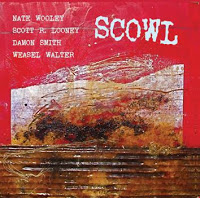By Paul Acquaro
I wonder what would make music like ‘Scowl’ of interest to the ‘lay’ listener? I suppose this is a question that has been asked in varying ways many times before, and no doubt will continue to be asked as members enter and (dare I say?) leave the fold of avant garde jazz. I don’t pretend to have an answer, nor will I even posit a theory, all I can offer is that It is a compelling listen that offers the small raptures of pleasure in each one of its five sermons.
I believe that a fair comparison can be drawn to the efforts of Evans, Halvorson and Walter’s recent release ‘Electric Fruit‘. In writing about that release, I said it was “a celebration, a joyous racket, a jumble of adjectives and superlatives running roughshod on the expected. The songs are ever shifting and building explorations of texture, tonality and expression.” That description fits decently well here too. While the actual connective tissue between efforts is percussionist Weasel Walter, ‘Scowl’ is a like-minded excursion into purely improvised music that eschews any traditional song structures, harmonic cliches and expected rythmic figures. The music feels uninhibited, flowing and natural, capturing the spirit, even as it at first presents disorder to the ears.
All acoustic, Nate Wooley’s trumpet, Damon Smith’s bass, Scott R. Looney’s piano and Walter’s percussion exploit all the angles, sides, valves, keys, strings, and resonant surfaces available. Unbound from convention and expectations, the tracks veer from full throttle collective improvs to quiet exploits between the various combinations and extended techniques of the instruments. While describing each track would be a lexical adventure, an exemplar is ‘Tomb Trisects’ which begins with shards of bowed bass and leads into a dense mix with voices rising and receding, the musicians creating a journey through sound and time. The piano lays down a spontaneous figure that blends into the trumpet performing a solo that is more texture than sound. Walter lays out at times, and then bursts into the scene with clicks, clacks, thuds, executed with expert timing. Quiet moments appear as well, with Wooley playing short melodic phrases with a tone that brings to mind 1960’s Miles Davis.
While ‘Scowl’ is a recording that requires repeated and intense listening, it is not without reward. It is smart, suggestive, hedonistic and cathartic. Though I have yet to answer the questions I began with, it with assurance that say that on each spin it reveals more and more.
© Paul Acquaro


